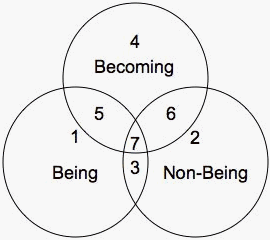Happy Birthday Mozart!
250... not bad. Just got finished listening to the Die Zauberflote in your honor. Timeless.
Amendment IX - The enumeration in the Constitution, of certain rights, shall not be construed to deny or disparage others retained by the people. [Ratified: December 15, 1791]
"Those who educate children well are more to be honored than they who produce them; for parents only gave them life, the good educators though gave them the art of living well."

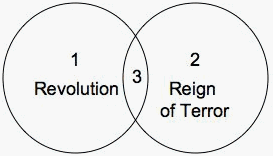
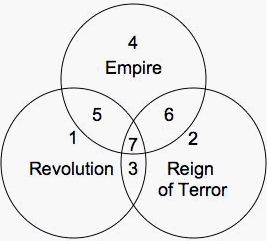 You must assume that the notion "empire" is somehow a product of the middle term between the reign of terror and the revolution. I've seen this argued, albeit somewhat unconvincingly. But it doesn't matter, what matters is that you see how this works. "I am the Revolution" is negated and turns out to be the "Reign of Terror". The double negation of both leads to the "Empire" (in one sense, the spreading of the revolution and the reign of terror to the world). A9 commenter angelica poses this somewhat American spin on things.
You must assume that the notion "empire" is somehow a product of the middle term between the reign of terror and the revolution. I've seen this argued, albeit somewhat unconvincingly. But it doesn't matter, what matters is that you see how this works. "I am the Revolution" is negated and turns out to be the "Reign of Terror". The double negation of both leads to the "Empire" (in one sense, the spreading of the revolution and the reign of terror to the world). A9 commenter angelica poses this somewhat American spin on things.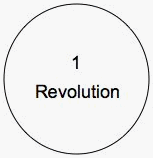
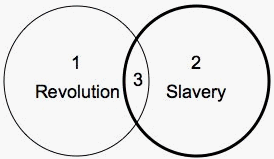
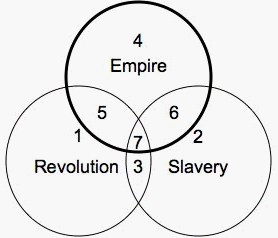 Given the rather extreme Constitutional changes following the Civil War, any legal scholar would agree some sort of regime change took place. Giving it the tag of "empire" is arguable, but in my opinion, quite right.
Given the rather extreme Constitutional changes following the Civil War, any legal scholar would agree some sort of regime change took place. Giving it the tag of "empire" is arguable, but in my opinion, quite right.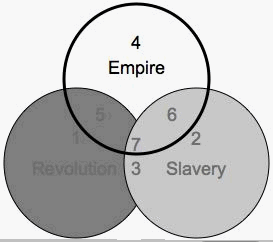
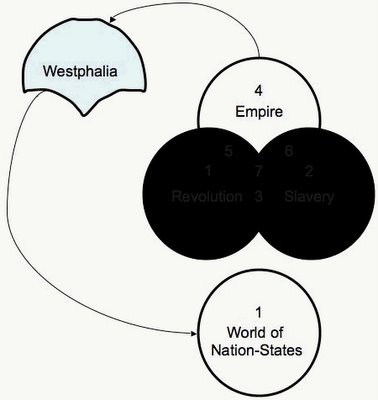 Here we are then, in today's order, which took a lot of blood, sweat and tears to achieve, the world of nation-states. Speculative moments are almost always violent and take a long time to achieve. Especially when they posit to the being side of things. Creation is a bloody enterprise (as we are seeing) and always involves more than the planners could have anticipated.
Here we are then, in today's order, which took a lot of blood, sweat and tears to achieve, the world of nation-states. Speculative moments are almost always violent and take a long time to achieve. Especially when they posit to the being side of things. Creation is a bloody enterprise (as we are seeing) and always involves more than the planners could have anticipated.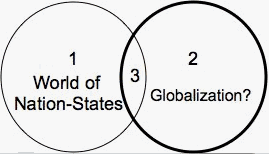 And since we now know that out of a negation a double negation is formed (eg, section 3 in the diagram above) we know that a sublative moment is about to occur. In other words, the opposition between nation-states and globalization is aiming towards some goal. And that goal is the double negation.
And since we now know that out of a negation a double negation is formed (eg, section 3 in the diagram above) we know that a sublative moment is about to occur. In other words, the opposition between nation-states and globalization is aiming towards some goal. And that goal is the double negation.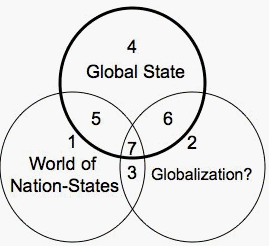 Clearly, we are nowhere near section 4 as of today. Globalization has just burst onto the scene and begun its process of negation. We don't even know where the areas of double negation are yet. However, we do see evidence of 4 coming to be. Regional cooperation between nation states, NAFTA, CAFTA, the WTO, etc. all appear to be areas of possible double negation (that is, they are the negation of the negation, or what rises above the negative effects of globalization). Out of these areas one can guess some sort of framework will arise, perhaps decades, maybe even generations from now.
Clearly, we are nowhere near section 4 as of today. Globalization has just burst onto the scene and begun its process of negation. We don't even know where the areas of double negation are yet. However, we do see evidence of 4 coming to be. Regional cooperation between nation states, NAFTA, CAFTA, the WTO, etc. all appear to be areas of possible double negation (that is, they are the negation of the negation, or what rises above the negative effects of globalization). Out of these areas one can guess some sort of framework will arise, perhaps decades, maybe even generations from now.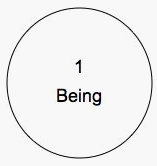 The next moment shows what being reveals itself to be, non-being. Being exists only insofar as it is opposed to something, but that something is the very essence of the thing itself. Think life and death... what would life mean if we were immortal? Etc. Note also the similarity to Heraclitus here. For both Hegel and Heraclitus every thing "wants" its negation. It desires it the same way a man desire sexual gratification. The desire is fullfilled or marked by the conclusion of the sexual act. Being wants what it is, and what it is is non-being (its negation).
The next moment shows what being reveals itself to be, non-being. Being exists only insofar as it is opposed to something, but that something is the very essence of the thing itself. Think life and death... what would life mean if we were immortal? Etc. Note also the similarity to Heraclitus here. For both Hegel and Heraclitus every thing "wants" its negation. It desires it the same way a man desire sexual gratification. The desire is fullfilled or marked by the conclusion of the sexual act. Being wants what it is, and what it is is non-being (its negation). 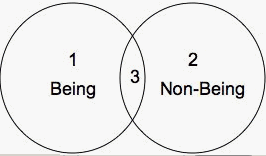 The third moment of being/non-being is the sublative moment, the process of taking the middle term between the two and sublating it into a new, separate posited existence. That is, out of section 3, (the negation of the negation) a third entity will arise (non-being is the negation of being, vice versa, but section 3 is a unique substance as it comprises the negation of both). Another way to think of this is to simply allow being/non-being to transition back and forth repeatedly. Eventually a third moment is realized out of this transitioning... that third moment is where being and non-being resolve themselves, it is becoming.
The third moment of being/non-being is the sublative moment, the process of taking the middle term between the two and sublating it into a new, separate posited existence. That is, out of section 3, (the negation of the negation) a third entity will arise (non-being is the negation of being, vice versa, but section 3 is a unique substance as it comprises the negation of both). Another way to think of this is to simply allow being/non-being to transition back and forth repeatedly. Eventually a third moment is realized out of this transitioning... that third moment is where being and non-being resolve themselves, it is becoming.